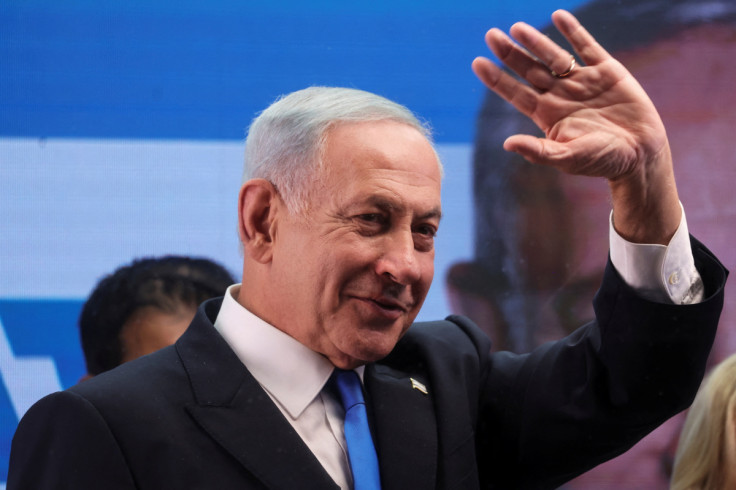Netanyahu Set For Comeback, Says On Brink Of "big" Election Win

Israel's former premier Benjamin appeared set to return to power on Wednesday, saying his right-wing camp was on the cusp of a great election win, after exit polls predicted his bloc gaining a slim parliamentary majority.
"We have won a huge vote of confidence from the people of Israel," a smiling Netanyahu told cheering supporters at his Likud party election headquarters. "We are on the brink of a very big victory."
His voice hoarse from weeks of campaigning across the country, Netanyahu vowed to form a "stable, national government," as the crowd interrupted him singing "Bibi, king of Israel."
Lifted by a strong showing from his far-right and religious allies, Netanyahu, who is on trial for corruption he denies, was on course for a comeback, according to Israeli television exit polls late on Tuesday, which predicted his bloc of four parties taking 62 of the Knesset's 120 seats.
Less than 18 months out of office, Netanyahu said he would wait for the actual vote count, with final results expected in the coming days.
The record 12-year consecutive reign of Israel's longest serving prime minister ended in June 2021 when centrist Yair Lapid managed to stitch together an unlikely coalition government of liberals, rightists and Arab parties.
But the fragile alliance unravelled a year into its rule.
As actual results began trickling in, Lapid stopped short at conceding the election and said he would wait until the final count. Exit polls late on Tuesday predicted his camp would take 53-54 Knesset seats, far behind Netanyahu.
"The people want a different way. They want security," Netanyahu said, "they want power, not weakness ... they want diplomatic wisdom, but with firmness."
Israel's fifth election in less than four years was dominated by the outsized personality of Netanyahu, whose legal battles have fed the stalemate blocking Israel's political system since 2019 and deepened the split between his supporters and opponents.
The campaign was shaken up by firebrand West Bank settler Itamar Ben-Gvir and his ultra-nationalist Religious Zionism list, now poised to be the third-largest party in parliament after surging in from the political margins.
Netanyahu has been counting on support from Ben-Gvir and fellow far-right leader Bezalel Smotrich.
But the prospect of a government including Ben-Gvir, a former member of Kach, a group on Israeli and U.S. terrorist watchlists, and who was once convicted for racist incitement, risks alarming allies including Washington.
In an apparent attempt to allay fears abroad, Netanyahu, who in 2020 forged formal diplomatic ties with the United Arab Emirates and Bahrain, said a government under his leadership would act responsibly, avoid "unnecessary adventures" and "expand the circle of peace."
Nonetheless, his possible comeback reinforced Palestinian scepticism that a political solution to the conflict was likely after a campaign which unrolled during increasing violence in the occupied West Bank, with near-daily raids and clashes.
© Copyright Thomson Reuters 2025. All rights reserved.





















